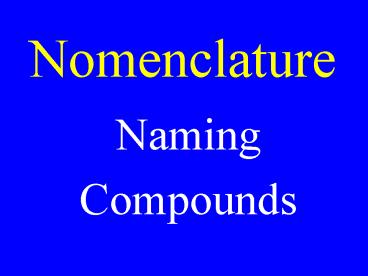Nomenclature - PowerPoint PPT Presentation
1 / 68
Title:
Nomenclature
Description:
Name positive element first with its normal name ... Cesium oxide. Barium chloride. Calcium phosphide. Aluminum sulfide. Name each of the following: ... – PowerPoint PPT presentation
Number of Views:157
Avg rating:3.0/5.0
Title: Nomenclature
1
Nomenclature
- Naming
- Compounds
2
Binary Compounds
3
- Compounds with only two elements in any ratio
4
KCl NO2 CaCl2 P2O5 Al2O3 H2S Na2O etc
5
- Binary compounds can be either ionic or covalent
6
Naming Binary Compounds
7
Naming Ionic Compounds
8
- Name positive element first with its normal name
- Name negative element last change its ending to
-ide
9
KClCaCl2Al2O3 Na2O
10
Name Each
- CaCl2 CaS
- K2O LiF
11
Name Each
FeCl2 FeCl3
12
If the Positive element is not from columns I or
II
- its ox must be determined and written in roman
numerals
13
Determining the Charge
- Add up the oxidation numbers of all the negative
elements - The positive portion must balance out the
negative portion - Divide the positive portion by the metal subscript
14
Name Each
CuCl Fe2O3MnO2 CrO3
15
Molecule
16
- A covalent compound that can exist as a separate
unit - Non-metals bond to form molecules
17
Naming Molecules or Covalent Compounds
18
- Same rules as ionic compounds except
- use geometric prefixes to determine the of each
atom
19
Geometric Prefixes
- 1-mono 5-penta
- 2-di 6-hexa
- 3-tri 7-hepta
- 4-tetra etc
20
Name Each
CO S2O3N2H4 SO3
21
Drill Name Each
CaO P2O5Al2S3 SO2
22
Deriving Formulas
- Write the symbol for each element
- Determine ox s for each
- Determine lowest common multiple to balance the
charge - Apply subscripts
23
Write formulas for
- Sodium sulfide
- Lead (II) iodide
- Diphosphorus
- pentoxide
24
Write formulas for
- Chromium(III) oxide
- Aluminum carbide
25
Polyatomic Ion
26
- A group of atoms chemically combined that
together have a charge
27
- Most are oxoanions
- PO4-3 SO4-2
- A root element bound to oxygen
28
Drill Name each
- CuCl2 KBr
- PCl5 MgO
- Mn2O7 S2O3
29
Naming Polyatomic Ions
30
- Name the root element
- Change the ending
- to -ate
- PO4-3 phosphate
- Some are unusual
31
CN-1 OH-1 C2H3O2-1C2O4-2
32
H2O H3O1NH3 NH41
33
Polyatomic Ion Endings
- Maximum O -ate
- 1 less than max O -ite
- SO4-2 sulfate
- SO3-2 sulfite
34
Naming Ternary Compounds
35
Ternary Compounds
- Compounds containing more than two different
elements - Most contain polyatomic ions
36
- Follow ionic rules for naming the compound
- Name the polyatomic ion as the positive or
negative portion
37
Name Each
CaCO3K2SO4
38
Drill Name
Pb(NO3)2 MgSO3
39
Write Formulas For
- Lead (II) nitrate
- Aluminum sulfate
- Potassium chlorate
- Ammonium phosphite
40
Name the Following
- BaSO4 CuNO3
- SO2 (NH4)3PO4
41
Naming Acids
42
- Binary acids become
- Hydro _____ ic acids
- HCl - Hydrochloric acid
43
- Ternary acids become
- _____ ic acids or
- _____ ous acids
- H2SO4 - Sulfuric acid
- H2SO3 - Sulfurous acid
44
- ____ ic acids form from polyatomic ions ending
with ___ ate - ____ ous acids form from polyatomic ions ending
with ___ ite
45
- ___ ide ions become
- hydro ___ ic acids
- ___ ate ions become
- ___ ic acids
- ___ ite ions become
- ___ ous acids
46
Name or Give Formulas For
- HBr(aq) H2SO4(aq)
- NaVO3 (NH4)3PO3
- Phosphoric acid
- Nitric acid
- Chloric acid
47
Drill Name each
- KBr MgS
- BaF2 K3P
- K2O LiH
- Al2O3 H2S
48
Derive formulas for each
- Cesium oxide
- Barium chloride
- Calcium phosphide
- Aluminum sulfide
49
Name each of the following
- SeO CS2
- NO2 Cl2O
- N2O4 PCl3
50
Derive formulas for each
- Silicon dioxide
- phosphorus trichloride
- Sulfur hexafluoride
- Iodine trifluoride
51
Name each of the following
- SO4-2 SO3-2
- PO4-3 NO3-1
- ClO4-1 ClO3-1
- ClO2-1 ClO-1
52
Derive formulas for each
Chromate Sulfate Arsenate Nitrate Arsenite Cy
anide Bromite Acetate
53
Name each of the following
HCl H2SO4 H2S H3PO3 HNO3 HBrO H2CO3 HBrO4
54
Derive formulas for each
- Chromic acid
- Hydroiodic acid
- Sulfurous acid
- Bromic acid
55
Name each of the following
- CuO MnS
- PbO2 Cu2O
- CrCl2 MnF2
- CrCl3 SnCl4
56
Percent Compositionby Mass
57
- Determine the atomic mass of each element in the
compound - Determine the molecular mass of the compound by
adding - Divide each elemental mass by molecular mass
- Multiply by 100
58
MgCl2
- Mg 24.3 g/mole
- 2 Cl 2 x 35.5 71.0 g/mole
- MgCl2 total 95.3 g/mole
- Mg 24.3/95.3 x 100
- Cl 71.0/95.3 x 100
59
Determine Comp for Each
- Fe2O3
- C3H6O3
- CuSO45H2O
60
Drill Determine Comp for Each
C3H6O3 CuSO45H2O
61
Name each of the following
FeO Fe2O3
62
Derive formulas for each
- Lead(IV)oxide
- Copper(II)sulfide
- Manganese(VII)oxide
- Nickel(II)fluoride
63
Name each of the following
- BaCO3
- KNO2
- CuClO3
- Al2(SO4)3
64
Derive formulas for each
- Potassium sulfate
- Lead(II)chromate
- Aluminum hydroxide
- Ammonium cyanide
65
Name each of the following
- Cl2O SO2
- N2O3 P2O5
- CO2 CO
- SO3 N2H4
66
Name each of the following
NH4Cl BaSO4 KC2H3O2 K2HPO3 KNO3 CuBrO Li2CO3
MgC2O4
67
Name each of the following
KCl MnSO4 SO2 HI(aq) NaNO3 HClO H2CO3(aq)
NH4BrO4
68
Name each of the following
NaCl MnSO4 S2O3 HBr(aq) Na2CO3
HClO HNO3(aq) NH4IO4































